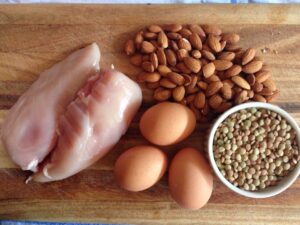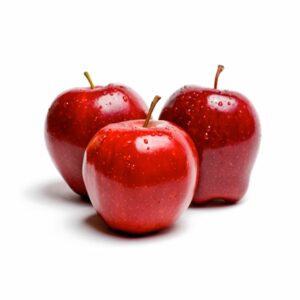So you’re aged and often ask yourself “how to lose weight after 50”. Congratulations! Losing weight after 50 is a great goal, and there are plenty of ways to make it happen. In this blog post, we will discuss 8 tips that will help you lose weight safely and effectively. Follow these tips, and you’ll be on your way to a healthier, slimmer you!
Contents
How To Lose Weight After 50
Here are 8 solid tips to lose weight after your 50s.
Start Small
Losing weight or any other significant lifestyle change can be intimidating, especially when you’re over 50. To make the process easier and less overwhelming, start by making small changes to your eating habits and exercise routine. For instance, try drinking more water throughout the day and avoiding processed snacks. You’ll find that these small changes can lead to bigger ones over time. Furthermore, if you’re having trouble sticking to your plan, try setting achievable goals and rewarding yourself for reaching them.
Here are 6 small changes to do and how to do them:
- Cut out processed snacks: Instead of buying pre-made snacks, opt for healthier options such as fruit and nuts.
- Reduce sugar intake: Avoid adding sugar to your food or drinks, and try using natural sweeteners like honey or stevia.
- Increase vegetable consumption: Aim to have at least one serving of vegetables with each meal, and experiment with new recipes that incorporate more veggies into your diet.
- Reduce portion sizes: Instead of eating big portions, opt for smaller servings and snacks of healthy foods in between meals for satiety.
- Avoid alcohol: Alcohol can have a significant impact on your weight and overall health, so it’s best to avoid or limit its consumption.
- Eat breakfast every morning: Eating breakfast kick-starts your metabolism and gives you the energy to get through the day.
Move More
Exercise is paramount for weight loss after 50, as it helps to boost your metabolism, burn calories, and strengthen your muscles. Aim for 30 minutes of moderate-intensity exercise such as walking or swimming 3-4 times a week. You can also join an exercise class or gym if you have access to one. Additionally, try to make physical activity a part of your daily routine by taking the stairs, parking further away from your destination, and walking or biking short distances.
Here are 10 solid ways to move more:

- Join an exercise class or gym: An exercise class or gym can be a great way to stay motivated and reach your weight loss goals.
- Take the stairs: Taking the stairs instead of the elevator or escalator can help you stay active and burn extra calories throughout the day.
- Walk or bike short distances: Try replacing short car trips with walking or biking to give your body an extra physical boost.
- Do yard work: Yard work is a great way to keep fit, as it requires bending, lifting, and other physical activities that can help you shed some pounds.
- Take up a sport: Taking up a sport is a great way to stay active and have fun at the same time.
- Dance: Dancing not only provides physical activity but has been linked to improved mental and emotional health as well.
- Gardening: Gardening is a great way to stay physically active while enjoying the outdoors.
- Take up swimming: Swimming is one of the best forms of exercise, as it helps to build strength and endurance without putting too much strain on your body.
- Do household chores: Doing simple housework such as vacuuming, dusting, and mopping can help you stay active throughout the week.
- Get a dog: Taking care of a pet is an excellent way to stay physically active and fit.
Eat Healthy Foods
Eating healthy is essential for weight loss after 50. Focus on eating nutrient-dense foods such as fruits, vegetables, lean proteins, whole grains, and healthy fats. What’s more, stay away from processed and sugary foods as they can add extra calories without providing any nutritional value.
Here are 7 simple tips to help you eat healthier:
- Read food labels: Reading labels can help you make better dietary choices as it provides nutritional information about the product.
- Eat a variety of foods: Aim to incorporate a variety of whole foods from the five major food groups into your diet.
- Cut back on processed foods: Try to limit the consumption of processed, sugary, and fatty foods as they are usually low in nutrition and can lead to weight gain.
- Reduce sodium intake: Sodium is often added to food to enhance flavor, so try reducing your sodium intake by avoiding processed foods and seasoning with herbs and spices instead.
- Eat fiber-rich foods: Eating fiber-rich foods such as fruits, vegetables, legumes, and whole grains helps to keep your digestive system healthy and can help you feel fuller for longer.
- Reduce portion sizes: Limiting the amount of food you eat per sitting can help to prevent overeating and weight gain.
- Avoid snacking late at night: Late-night snacking can lead to weight gain as it’s harder for your body to process the food during this time.
Increase your protein intake
Protein is an important nutrient that helps to build and maintain muscle mass, which can help you lose weight as muscle burns more calories than fat. Moreover, protein-rich foods tend to be more filling, which can help you manage your appetite. Additionally, protein helps to preserve lean muscle mass as you age, which is key for maintaining a healthy weight.
Here are some tips to increase your protein intake:

- Eat lean proteins: Lean proteins such as chicken, fish, and turkey contain fewer calories and fat compared to other sources of protein.
- Incorporate plant-based proteins: Legumes, nuts, and seeds are excellent plant-based sources of protein that can be easily added to your meals.
- Eat high-protein breakfasts: Starting your day with a breakfast rich in protein may help keep you full throughout the day and prevent cravings.
- Choose Greek yogurt: Greek yogurt is packed with protein and is a healthier alternative to other dairy products.
- Try protein shakes: Protein shakes are an easy and convenient way to increase your daily intake of protein.
- Add nuts or seeds to meals: Adding a handful of nuts or seeds such as almonds, chia seeds, or flaxseeds can add extra protein and fiber to your meals.
- Have eggs for breakfast: Eggs are an excellent source of protein and can be cooked in various ways to make a delicious and healthy meal.
- Include seafood in your diet: Seafood is high in protein and omega-3 fatty acids, which can help reduce inflammation, improve heart health, and aid in weight loss.
Get good quality sleep
Getting a good night’s sleep is key to overall health, as it helps to regulate hormones that control hunger and appetite. Aim for 7-8 hours of quality sleep every night and try to avoid looking at screens before bed as this can disrupt your body’s natural sleep cycle. Besides, try to keep your bedroom cool, dark, and quiet for optimal sleeping conditions.
Here are some tips to help you get better quality sleep:
- Stick to a regular sleep schedule: Going to bed and waking up at the same time each day will help your body adjust to a regular routine.
- Avoid caffeine late in the day: Caffeine is a stimulant that can interfere with sleep, so try to avoid caffeine late in the day or opt for decaffeinated beverages.
- Limit tobacco and alcohol consumption: Nicotine and alcohol can interfere with your sleep, so try to limit your consumption of these substances.
- Create a bedtime routine: Having a relaxing bedtime routine can help you wind down before bed – read a book, listen to calming music, or practice yoga.
- Keep your bedroom cool and dark: Make sure your room is comfortably cool (around 65°F) and as dark as possible – blackout curtains can help block out light from outside.
- Get exposure to natural light during the day: Spending time outdoors in natural daylight will help regulate your body’s sleep-wake cycle.
Manage your stress
Stress can lead to overeating and weight gain, so it’s important to find ways to manage it. Additionally, chronic stress can have a negative impact on your overall health. Moreover, as you age, it’s important to take steps to reduce stress and find ways to stay positive.
Here are some tips to help manage stress:

- Practice relaxation techniques: Practicing relaxation techniques such as meditation, deep breathing, and yoga can help reduce stress levels.
- Connect with people: Social support is important for stress management, so make sure to take the time to talk and connect with friends, family, or a mental health professional.
- Take breaks during the day: Schedule regular breaks throughout your day to give yourself some time away from work-related stressors.
- Make time for activities you enjoy: Doing something that you enjoy, such as reading a book or going for a walk, can help reduce stress levels.
- Write in a journal: Keeping a journal to express your feelings and emotions can be an effective way to manage stress.
- Seek professional help if needed: If your stress is becoming unmanageable, don’t hesitate to reach out for professional help.
Drink plenty of water
Staying hydrated is important for overall health, and it can also help with weight loss. Try to drink at least eight 8-ounce glasses of water each day, and more if you are active or working out. You can also add flavor to your water by adding fresh fruits or herbs such as mint or cucumber. In addition to this, try to avoid sugary drinks and alcohol as these are high in calories and can lead to weight gain.
Here are some tips to help you stay hydrated:
- Carry a reusable water bottle: Carry your own water bottle with you so that you’re not tempted to buy sugary drinks.
- Drink water before meals: Drinking a glass of water before each meal will help you feel fuller, making it easier to eat less and lose weight.
- Add flavorings: Adding fresh fruits or herbs can make your water more enjoyable and helps you stay hydrated.
- Try cucumber or lemon water: Both cucumber and lemon can help add a refreshing flavor to your water while providing added health benefits.
- Avoid sugary drinks and alcohol: These are high in calories, so try to avoid these drinks as much as possible.
- Drink before, during, and after exercise: Staying hydrated can help improve performance and reduce fatigue during physical activity.
- Set reminders: You can set reminders on your phone to remind you to drink water throughout the day.
- Monitor your urine: Dark-colored urine is an indication that you’re not drinking enough, so make sure to increase your water intake if this is the case.
Eat more high-fiber foods
Fiber is an important nutrient for weight loss. It helps to reduce hunger and keeps you feeling fuller for longer. Aim to eat at least 25-30 grams of fiber each day. What’s more, high-fiber foods have been shown to reduce the risk of chronic diseases such as heart disease and diabetes.
Here are some high-fiber foods to try to include in your diet:

- Whole grains: Oatmeal and brown rice, are packed with fiber and help to keep you feeling full.
- Legumes: Beans, lentils, chickpeas, and peas are all excellent sources of fiber.
- Nuts and seeds: Nuts and seeds are a great snack option that is high in fiber and good fats.
- Fruits and vegetables: Fruits and vegetables are packed with fiber, vitamins, minerals, and antioxidants.
- Chia seeds: Chia seeds are a great source of fiber and healthy fats.
- Flaxseed: Flaxseeds are high in fiber, omega-3 fatty acids, and antioxidants.
- Dark chocolate: Dark chocolate is a great source of healthy fats, antioxidants, and fiber.
- Avocado: This popular fruit is high in fiber and good fats.
Conclusion
Losing weight after age 50 can be challenging, but it’s definitely possible with the right approach. To successfully lose weight, try to maintain a healthy diet, reduce your calorie intake, and increase your physical activity. Additionally, make sure to stay hydrated and include plenty of high-fiber foods in your diet. With consistency and dedication, you can successfully reach your weight loss goals.
Consider contacting FitMantra for additional information on nutrition and fitness. You can also get in touch with their nutrition experts through our online nutrition counseling, who can guide you through the process and help you achieve your fitness goals. You can also lose weight with the help of our weight loss program. Download our Fitness app on Android to learn more about us.
